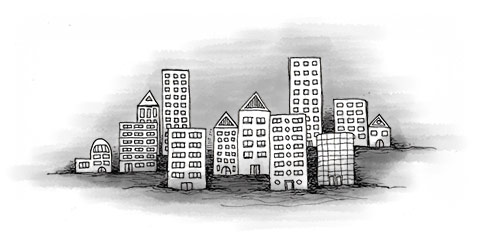There are some health precautions to take when you move into a new apartment. Since bugs and mosquitoes will likely have made themselves a home in your flat it is important to have mosquito repellent. Repellent packages usually come with a plug-in vaporizer and disposable cartridges that last about 40 days. The most popular brands in India are All-Out and Guard Knight.
Be aware that these repellents have no effect on cockroaches. Deal with them by keeping your food nicely packed - using zip-bags, for example.
You should also clean plates and cutlery before eating (use boiling water for this) to make sure that no potentially infectious substances are left on them.
Electricity in India
Before moving into a flat you should check the electrical wiring and all fuses. If you find uninsulated wires you should kindly ask your landlord to either remove or insulate them.
Many fuses used in India do not have especially thin fuse wires but simply regular ones. The positive aspect is that you will hardly ever have to change them, but obviously this is not the main point about fuses. To make sure they work properly you should change their wires or get new ones, which will be easier. Fuses are available at many electronic stores.
There are only government-run electricity providers in India. Since there are many different providers with different areas of responsibility, you should ask your landlord to set up the connection for you. Also, make sure that there are no outstanding electricity bills for your flat.
Your electricity bill will be issued every month and you can pay it at either a state-run collection centre in your area or at a local e-SEVA shop, operated by the Indian post. Another option is to have your landlord pay the bills and give him the money. Make sure that you get to see a bill once in a while to ensure you are not overcharged
India uses a standard electrical current of 240 volts at 50 hertz. Plugs come in at least three designs: Three-pronged round pins (as in Hong Kong), two flat pins (as in the US but without the ground wire) and two narrow round pins (as in Europe). Adapters are widely available in Indian electronic stores.
Since voltage fluctuations are common in India it is not advisable to bring electronic devices from home. You should buy new appliances in India. They will be better suited for Indian voltage fluctuations. Even if they do break they will have been cheaper than your appliances from home.
Electricity blackouts are very common in India, especially in peak times in summer. Blackouts of up to four hours a day occur quite often. You can buy a back up supply, such as an Uninterrupted Power Supply (UPS) to save your electronic equipment from damage through blackouts, or even get a portable power generator that runs off of gasoline.
Water
Tap water in India is not drinkable! We therefore recommend getting either a water filter or a water dispenser. The base unit of a water dispenser can be purchased at any supermarket. Water containers can be delivered directly to your home, for around Rs.30 per container.
In addition there is restricted water supply in many Indian cities. Tap water may only be available for between two and four hours a day! Therefore, the majority of Indian houses have underground tanks storing up water. There are also many private water supply companies that sell water for around Rs400 per tank load.
Water is provided by local councils. You will have to contact the appropriate council in order to get a connection. The bill will be issued every month and it can be paid either at a local water board collection centre or at an e-SEVA shop.
Gas
Gas supply in India is mostly provided by portable cylinders. You can simply go to one of the gas cylinder dealers and make an arrangement. They will deliver full cylinders to your house and pick up empty ones. There are also governmental gas companies that sell gas a lot cheaper. They will have wait-lists, however, and these sometimes last over a year.
Since electricity blackouts are quite common and unpredictable in India you will have no choice but to use gas for cooking. As flats come unfurnished you will also have to buy a gas stove yourself. Stoves including an oven are rare in India due to the Indian style of cooking. If you manage to find one you will have to pay a lot more than for a simple gas stove.
Before buying a stove you should check it thoroughly! Gas regulators should work smoothly and the rubber hose connecting the stove and the cylinder should not be porous. When you buy a stove, check these parts at least once a month and change the rubber hose regularly.
Housekeeping services
In India it is quite common and comparatively cheap to use housekeeping services. The services offered by an aya vary greatly and have to be agreed upon in advance. Your housekeeper will never perform tasks that were not explicitly stated in the beginning, unless you pay extra for it.
Some aya speak English and have experience working for foreigners. These will generally be more expensive. If you are living alone it can be great to return home from work to find all your clothes washed and ironed and your evening dinner waiting for you in the microwave.
Remember that some housekeepers may not be used to dealing with foreigners and their cultural habits. Be patient with your instructions and expectations. It will take some time for you to get used to each other. You should, however, always give clear and direct instructions.

